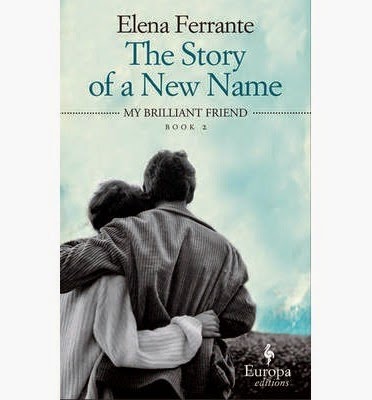How embarrassing. I’ve searched my bookshelves high and low
and cannot for the life of me find my copy of the book that I rated number
eight in my “Twelve Days of Translated Fiction” listing for 2014. Looks like I’ll
just have to refer to my notes from April and see how I go.
Yes, I keep a hard copy of notes from all the books I read
throughout the year, I did try a soft copy for a short while, however referring
back and forth, notes in margins, references to quotes etc. I find a lot easier
when using an actual notebook, with a pen, those antique implements which
dispense ink onto paper. I own a “Waterman” pen, which is named after Lewis
Edson Waterman, an insurance broker who “invented” the first fountain pen in
1883. And in case you’re wondering I only used recycled, non-bleached papers to
write upon (of course).
“The Story of a New Name” by Elena Ferrante came to my
attention through the 2014 Best Translated Book Award Longlist and Shortlist.
As I mentioned when I reviewed the book back in April, it is absolutely
shameful that it did not make the Independent Foreign Fiction Prize Long or
Shortlist and to see such pulp as Sayed Kashua’s “Exposure” on that longlist at
the expense of a work like this makes me feel the judges work on a theory of
where a book comes from, not its literary merits.
Our novel is the second in the Neapolitan series, following
on from “My Brilliant Friend” and followed up by “Those Who Leave and Those Who
Stay” (which I will review in the coming days), the fourth instalment will come
to us in September 2015.
The story is of Elena and Lila and their inseparable
relationship. We are in 1960’s Naples here, the families from poor backgrounds,
the criminal element highly regarded and not questioned, and the roles that
these characters play is to remove themselves from the day to day drudgery of
working in the local shoe factory or store. The matter of fact language about
their existence draws you slowly and slowly towards that time, fifty years ago,
and slowly you are fighting for Elena’s only escape from the treadmill, her
study, her fierce determination to become educated at all costs – that’s if her
relationship with Lila will allow it.
This is an amazing work, delving deep into the mind of Elena
and the her faltering self-confidence, her utter belief that she is not as
brilliant nor as pretty as Lila, the manipulation by her determined friend, but
the solid rock of friendship always piercing through, even when the workings of
Lila conspire to take everything from Elena.
The subtlety of the language, the nuanced approach to the
two characters, the slow revelation of the female form and needs is utterly
compelling, like Elena’s simple observations of mothers in the street:
They had been consumed by the
bodies of husbands, fathers, brothers, whom they ultimately came to resemble,
because of their labors or the arrival of old age, or illness. When did that
transformation begin? With housework? With pregnancies? With beatings?
These two Friends share so much, yet are so different, the
ever confident Lila, Elena who is wracked with self-doubt, Lila who has
affairs, Elena who breaks off with her only boyfriend, Lila living with riches,
creating works of art from photos, Elena jealous of Lila’s talent and fighting
to become educated. A wonderful observation of the powers of true friendship.
Yes, it’s Lila who makes writing
difficult. My life forces me to imagine what hers would have been if what
happened to me had happened to her, what use she would have made of my luck.
And her life continuously appears in mine, in the words that I’ve uttered, in
which there’s often an echo of hers, in a particular gesture that is an
adaptation of a gesture of hers, in my less which is such because of her more,
in my more which is the yielding force of her less. Not to mention what she
never said but let me guess, what I didn’t know and read later in her
notebooks. Thus the story of the facts has to reckon with filters, deferments,
partial truths, half lies: form it comes an arduous measurement of time passed
that is based completely on the unreliable measuring device of words.
This novel revels in the power of female relationships,
whether manipulative or supportive, and in my mind surpasses the introductory “My
Brilliant Friend” (although it is also an amazing work) and you’re going to
have to wait a day or two to find out what I thought about the third instalment
(unless you follow me on Twitter @messy_tony as I revealed a little there the
other day).

No comments:
Post a Comment